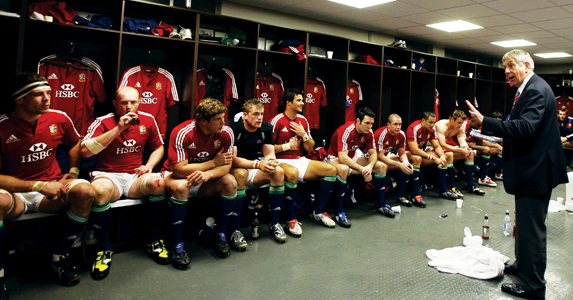Half-time can provide a crucial ten to 15 minutes for teams to regroup and refocus. It can be a turning point in any game. A team that wasn’t performing well in the first half can come out firing in the second, while the leading team can also go off the boil and squander their chance of winning the game.
Staying hydrated is very important and half-time gives every player the chance to take on some fluids. I suggest drinking an isotonic drink such as Gatorade or Powerade. The aim is to replace
the salts and minerals already lost as much as possible, and these products will help you to do this.
The players don’t eat at all in the middle of the game. They should be following a good nutrition programme and what they eat before kick-off should see them through the 80 minutes.
When the team first enters the locker room, they will sit down to hear the coaches and senior players talk. This isn’t a time to switch off and it’s important for the team to stay focused; the job’s only half done at this stage. So we’ll discuss how the first half has gone and what needs to be done in the second period, whether it’s improving on parts of our game or seeing through the game plan to the end. The players will usually drive this, and individuals may also be keen to talk about their own roles at this stage.
We’re lucky to have heated locker rooms, so the players won’t get cold in this short time. But if you don’t have a changing room or if it’s a chilly room, you must stay warm. Put an extra layer on or stay active by walking around. Don’t forget to drink, too. It’s easy to think you don’t need to top up on fluids if you’re not feeling too hot.
If there are any injuries in the team, or if anyone needs strapping up, the physios will attend to them at half-time. Make sure you’re well strapped before you go back out to play because once the game starts there won’t be enough time to receive proper treatment.
In the Guinness Premiership half-time lasts 15 minutes, whereas in most games you only get ten minutes. It’s important to warm up before you start playing again, so at Leeds Carnegie we’re always back out on the pitch after 12 minutes, before the referee comes to get us. Do some jogging on the spot or some dynamic stretches so that you’re ready to go for another 40 minutes.
It’s a good idea to get into a routine that you know works for you. Your aim is to be refreshed when you go back onto the pitch. Make the most of it.
Key Points:
Drink plenty but don’t eat
Keep warm and restrap
Listen to coaching advice
Steve Nance is the performance director at Leeds Carnegie.





